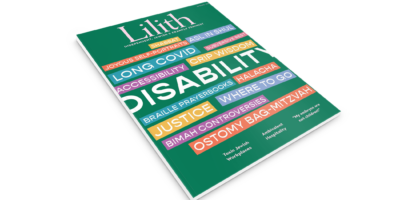
Photo by Annie Spratt on Unsplash
Wabi-Sabi
Miriam sets her alarm at 8.30 a.m. every morning even though she is dying.
“Why don’t you just wake up naturally with the sun?” I say pointing to her corner bedroom windows overlooking the New York City skyline.
“Hmmm, I don’t know,” she says, head on pillow, arms flopped over the white quilt. “It’s what I’ve always done.” We stare at each other for a while.
“Oh, Lise, this is hard.”
“What’s hardest about it?”
“It’s going in one direction and not a good one. I’m worried about how fuzzy my head is getting. I like being in control,” she says, smoothing out the quilt in front of her. A pile of unopened mail lies on the bed next to her. She boasts that she is meticulous with her finances and never made any mistakes, but recently she did, and it worries her.
We talk about the chaos of two wars spinning, Trump hovering, the internet spreading lies, AI writing sermons for clergy, and global warming setting California on fire, not to mention hurricanes, flooding and topsy turvy overwhelm.
“It’s probably a good time to exit,” she says, sipping her Ensure.
I look over at the dead flowers she keeps intentionally in a vase, and she tells me the aide, Susan, keeps trying to throw them out. (I had the same thought).
“Have you heard of Wabi-Sabi?” she asks.
I shake my head no. She nods her head at the flowers and explains that it’s the Japanese concept of beauty based on the idea that nothing lasts, nothing is finished, and nothing is perfect. The imperfection is what is exquisite about it, the fact that it is not forever makes it poignant. Miriam is a photographer, and her apartment is filled with her black and white body of work. I look up Wabi-Sabi later and read it’s anything that gives us “a sense of serene melancholy and a spiritual longing.” One of her photographs in the living room shows her two young granddaughters in a field of dead sunflowers holding hands and spinning in a circle. It makes me think of “end of the world” sci-fi, though these girls are so fresh and beautiful. The state of the sunflowers makes their youth even more moving. Very Wabi-Sabi.
“I had a hard morning,” she says when I walk in on our regular Tuesday afternoon.
“I thought I was going to die today, but I don’t think that now. My number two son called, the one who keeps asking for money. I told him ‘This is the last time’. I’m such a sucker.” She shrugs familiarly as if to say, ‘So, what do you want me to do?’ Then she changes tone and tenses up again.
“What is going to happen to him?”
She has told me about this son who is often unhoused. He can work but chooses not to. If she tries to cut him off financially, he threatens to steal and when that doesn’t work, he says he’ll starve. That’s what gets her in the gut.
“What can I do?” I say touching her hand.
“Put a pillow over my head,” she snorts at me.
“Are you in pain?”
“No, just in here,” she touches her forehead, skin tightly stretched with her worrying brain, always on alert.
Steven Jacobson, in his documentary Death Walker talks about the wretched anxiety, almost toxic fearfulness that we have in this country around death.
“Pain and suffering is the biggest fear, but we’ve dealt with that. What is left is the psychological torture many feel when they contemplate becoming nothing,” he says in his shamanic voice.
When I met her three months ago, Miriam answered the door with “Who are you?” even though I had blurted my name into the intercom minutes before and she had just buzzed me in.
An eternally suspicious New Yorker, she asked me again “What’s your name?”
I answered and without changing her expression, she walked me over to the couch in her bathrobe, eyebrows sketched on, and her hair freshly dyed dark brown. Then she made me sing for my supper.
“What do you do when you aren’t visiting dying people?” she said, spinning a gold bracelet slowly around her wrist. She moved to her rings, turning each thick band once around each finger, glossy with a fresh manicure.
“I’m a professor.” She liked that; test number one passed.
“Where do you live?” She asked. She knocked her two knobby knees together; they were wider than the bird legs beneath them.
“About five minutes from here.”
But when I shared that I was also Jewish and like her had once had cancer, we were friends. She fretted about the aide Susan moving her butter to another location in the fridge. She started out with a kind of superior attitude, fretting about ‘the help,’ but then I saw the fear underneath it.
“I’m an independent person,’’ she said, “I arrange things carefully.”
The phone rang and caller ID showed her it was her number one son.
“I’m here with Lise, a wonderful hospice volunteer, with beautiful curly hair,” she winked at me.
“Ok, bye. Love you.”
I was new to Hospice and before I came, I had scanned the training manual which cautioned me with its many commandments. It warned not to let patients and Hospice workers exchange any gifts: Dying makes one vulnerable, which means they can easily be exploited. Don’t talk too much: just be with patients and let them take the lead. Don’t bring any agendas.
This would be a challenge. I’m a talker. I’m also a problem solver and infamous for what I call ‘unsolicited, but stellar advice.’ But here I sit with Miriam and miraculously if I’m quiet, she blooms into talk.
“They want to send the chaplain over. I don’t need anyone here talking about Jesus.”
“You could ask him to leave out Jesus.”
“Well, I guess if they keep it short, it’s okay.”
“It could be comforting.”
I feel a wave of talk bubbling up. I want to tell her how twice I went to a chaplain when I got my diagnosis, and it was incredibly soothing. He just listened to my outpouring of anguish. Jesus did not get mentioned even once, but the chaplain had an aura of calm that enveloped me. We sit watching the fire video on the screen on the wall that makes a crackling sound. I manage to stay quiet.
For her birthday, I organize a party. I get a vanilla cake with layers of chocolate frosting, two candles with an 8 and a 9, a balloon with confetti sparkles on the inside and a plush heating pad (breaking one of the Hospice rules). We invite her granddaughters, her number one son, her tennis friend, but only the care team can make it in the middle of the day. We sing Happy Birthday and when we end with real panache on the penultimate line “Happy Birthday, dear Miriam.” She yells out “with an A” like a jazz improviser. She reads her cards, puts the heating pad on her lap, hugs the stuffed animal reindeer from Hospice and wears the knitted hand warmer homemade by a volunteer. She takes one teeny bite of icing from the cake.
Then the chaplain stands up and asks if he can give a blessing. She rolls her eyes at me.
“Just keep it short,” she mumbles.
Even though he’s been given instructions to leave out God and be “Jewish aware,” he reads an extravagantly Christian passage while she fiddles with the settings on the heating pad. The social worker is checking an urgent text that just came in, and I’m staring out the window. He sits down again and goes quiet, having blown his wad. The team of seven women get rowdy. We tease each other, eat cake, take pictures, and tell stories around Miriam the reigning queen, sparkling balloon bobbing right above her head like a crown. It’s getting loud and raucous, and I wonder if it is too much for her.
About a week after her birthday, things downshift. Now she doesn’t leave the bed, doesn’t sit up to eat. She seems distracted by invisible crumbs on her quilt. She squints her eyes and then looks like she is trying to pick them up. Then she abandons the task and looks back at me. She is yellow in the face, gray in the feet. Her eyes are half open when we are talking, and sometimes mid-conversation, she drifts off to sleep. She has given her son power of attorney. Next to Miriam’s bed, a yellow post-it says “in case of emergency, don’t call 911, call Hospice.”
Two days later, since the snow has canceled all my plans, I’m able to return.
I bring Matzo Ball soup from a place in town. Before Miriam can dig in, her eldest granddaughter who works nearby, comes whirling in like Mary Poppins, bedecked in a pink sweatsuit. Like me, she got the gift of a snow day. She climbs into bed next to Miriam with a Duncan Donuts takeout bag. She is wolfing down a breakfast burrito and offers a donut hole to her Grammy. Within seconds of her granddaughter’s entrance, Miriam is infused with life again, helium in her balloon.
When she tries the matzo ball soup, she declares it to be “Not too terrible.”
“What a rave, should I put that on Yelp?” I ask.
She shrugs, back to feisty Miriam. Nothing quite pleases her, the world always falls short except for her granddaughter.
“This is my girl,” she says, patting her granddaughter’s knee which is right next to her in a criss-cross applesauce position.
“I’m her favorite, just so you know,” the granddaughter says. She winks at me the way Miriam does. The phone rings, and she goes out of the room to answer.
The call was from Hospice trying to help move Miriam to the next stage of needs.
“We need to get Grammy to accept an adjustable bed, or Hospice won’t pay for the nurse to bathe her in bed,” she tells me.
When we go back to the room, I break the Hospice rule once again and shift into a used car salesman with the granddaughter as my wingman.
“Imagine how much more independent you’ll be when you need to sit up, just a push of a button,” I say. Miriam calls for Susan to help her lie down. Her granddaughter takes the opportunity to say, “If you had the bed right now, you wouldn’t even need to call Susan!”
“Who let these people in here?” Miriam whines sarcastically.
Her granddaughter makes a puppy face, “Pleeeez, Grammy.”
“I’ll think about it,” says Miriam.
Before I leave, the granddaughter says, “I’ll try to seal the deal today.”
Another one of her aides whirls by and hands her the vitamins in a pill container. I’m sitting by her bed with my tea, and she says,
“Why am I even bothering with this anymore?”
We both laugh at the thought of these multi-colored Dudley Do-Rights having any chance in hell of changing stage four lung cancer.
As the days go by, the social worker’s notes use the word cachectic which literally means wasting away. Miriam is melting, like the witch in The Wizard of Oz after Dorothy pours water on her.
When I come in the following week, Miriam is lying in the medical bed.
~
What I do now with Miriam is look at her and she looks at me. After a few minutes, she says,
“You have a magnificent face.”
At sixty, I don’t hear those kinds of things anymore. But I’ve seen her black and white photographs, not of fashion models but of people messy and marked by life with all the granular detail. She seems to be seeing past my gray hair and aging face, ashy from winter, to something ageless, the way I see hers.
Wabi-Sabi.



